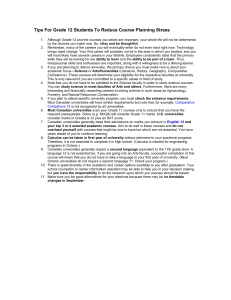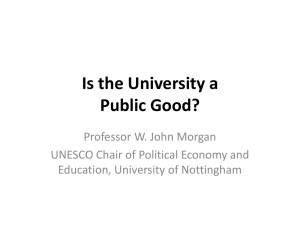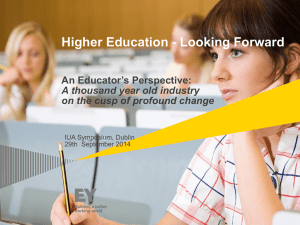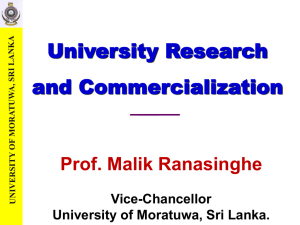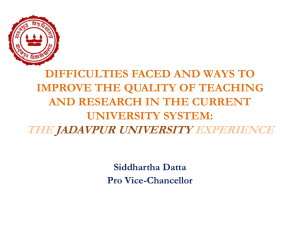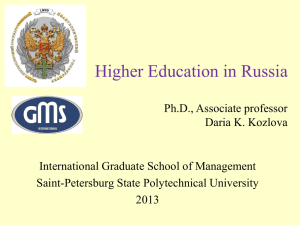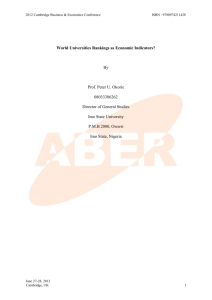Speech - The Hong Kong Institute of Education
advertisement
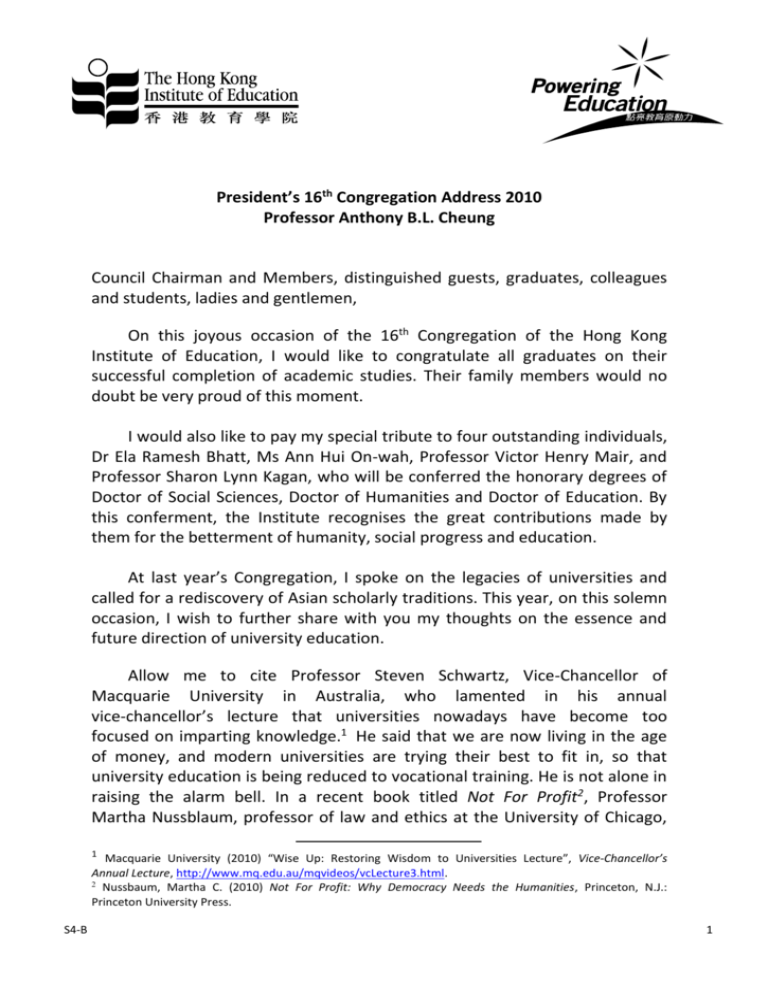
President’s 16th Congregation Address 2010 Professor Anthony B.L. Cheung Council Chairman and Members, distinguished guests, graduates, colleagues and students, ladies and gentlemen, On this joyous occasion of the 16th Congregation of the Hong Kong Institute of Education, I would like to congratulate all graduates on their successful completion of academic studies. Their family members would no doubt be very proud of this moment. I would also like to pay my special tribute to four outstanding individuals, Dr Ela Ramesh Bhatt, Ms Ann Hui On-wah, Professor Victor Henry Mair, and Professor Sharon Lynn Kagan, who will be conferred the honorary degrees of Doctor of Social Sciences, Doctor of Humanities and Doctor of Education. By this conferment, the Institute recognises the great contributions made by them for the betterment of humanity, social progress and education. At last year’s Congregation, I spoke on the legacies of universities and called for a rediscovery of Asian scholarly traditions. This year, on this solemn occasion, I wish to further share with you my thoughts on the essence and future direction of university education. Allow me to cite Professor Steven Schwartz, Vice-Chancellor of Macquarie University in Australia, who lamented in his annual vice-chancellor’s lecture that universities nowadays have become too focused on imparting knowledge.1 He said that we are now living in the age of money, and modern universities are trying their best to fit in, so that university education is being reduced to vocational training. He is not alone in raising the alarm bell. In a recent book titled Not For Profit2, Professor Martha Nussblaum, professor of law and ethics at the University of Chicago, 1 Macquarie University (2010) “Wise Up: Restoring Wisdom to Universities Lecture”, Vice-Chancellor’s Annual Lecture, http://www.mq.edu.au/mqvideos/vcLecture3.html. 2 Nussbaum, Martha C. (2010) Not For Profit: Why Democracy Needs the Humanities, Princeton, N.J.: Princeton University Press. S4-B 1 USA, observes that modern tertiary education has lost its way. She said that if society wants to produce graduates who have the ability to approach world problems as a “citizen of the world” and who can empathise, then it should reverse the current skew towards economic productivity and oversight on liberal and critical values at universities. Indeed, with today’s obsession on world rankings, which more often than not, are methodologically-biased, there is a risk of our universities becoming one-dimensional.3 Research assessment is driven more by citation indices than a balanced evaluation of the impact on scientific discovery and knowledge creation, as well as contribution to social progress and the enlightenment of humanity. Some eye-catching ranking exercises have the tendency to measure mostly tangible and quantifiable performance, but ignore equally important dimensions of a university’s role and mission, such as teaching quality, students’ learning experience, the nurturing of students’ social and global awareness, and the university’s contribution towards community and human development. Professor Schwartz calls for the imparting of wisdom to our university students. So what is wisdom? In the East, Confucius expounded it as follows: “大學之道,在明明德,在親民,在止於至善”. Translated into modern language, it means the way towards great learning involves the formation of 3 For instance, Shanghai Jiao Tung University’s Academic Ranking of World Universities tends to emphasise the scientific research performance of the universities, considering every university that has “any Nobel Laureates, Fields Medalists, Highly Cited Researchers, or papers published in Nature or Science” (http://www.arwu.org/ARWUMethodology2010.jsp), favouring research universities particularly those that are strong in the hard sciences and those from the English-speaking world (especially in North America). The QS (Quacquarelli Symonds)’s World University Rankings attach heavy weighting to peer evaluations and reputation of universities - 40% of the weighting is based on ‘Academic Peer Review’ and 10% on ‘Employer/ Recruiter Review’, while ‘Student Faculty Ratio’, ‘Citations per Faculty’ and ‘International Factors’ account for 20%, 20% and 5% respectively (http://www.topuniversities.com/university-rankings/world-university-rankings/methodology/weightings-ag gregation) - hence in effect favouring best-known universities. The Times Higher Education’s World University Ranking is comparably a more balanced measure but its weighting is also skewed towards research elements - ‘Research’ and ‘Citations’ share 30% each, and ‘Teaching’, ‘Industry Income’ and ‘International mix’ share 30%, 2.5% and 5% respectively (http://www.timeshighereducation.co.uk/world-university-rankings/). What is often common about international university ranking systems is the emphasis being put on research over teaching and on the hard sciences over other disciplines. S4-B 2 high moral character, enlightening the people (community), and ultimately achieving the ideal realm. University education, in its early tradition, in the East as well as the West, was about grooming scholar-leaders who excel in knowledge and culture, and who would lead society and the world with their virtuous character, high moral values, and a mastery of state-craft. These qualities constitute “leadership” in a holistic sense. With the popularisation of tertiary education, and the growing attention to human capital formation, education is often equated to vocational preparation. In the older days, undergraduate education was to provide for general, liberal education that sharpens thinking and enhances critical curiosity, with students undertaking more professionally-oriented education at the post-graduate level. Nowadays, university education is driven by market choices in favour of “vocational” type programmes, especially those leading to financially promising professional careers. The study of the humanities (like literature and language, history and philosophy), and of some social sciences (like sociology and anthropology) tends to become marginalised, because many would think that they broaden the mind, but not necessarily job opportunities. Philosophy once used to be cherished as the father of all knowledge but is now becoming an endangered species. In his book The University in Ruins4, the late Professor Bill Readings, a scholar of comparative literature at the University of Montreal, Canada, argued that with the ascendancy of higher education marketisation, culture is no longer seen as an important legitimating reference. The European tradition of the modern university had been grounded in the ideas of reason and culture. Today’s universities are “in ruin”, he said, because excellence is measured only by technological and utilitarian criteria. Instead of grooming wisdom and ideas, many universities are being pushed towards a very functionalist path of qualifications-generation and vocational training. In the local context, we are facing similar dilemmas and challenges. The community needs to wrestle with a paradox: On the one hand is the yearning for broadening the mind and extending the scope of general knowledge (as 4 S4-B Bill Readings (1996) The University in Ruins, Cambridge, MA: Harvard University Press. 3 indicated by the new emphasis on Liberal Studies in the senior secondary school curriculum and on General Education in undergraduate studies). On the other hand is a utilitarian culture that prevails in today’s climate of education. This is a climate where students turn away from the liberal arts and humanities because of the belief that these subjects carry little value in monetary terms. The community gives a sympathetic ear to the plea for more public funding and private donations towards research and development in the hard sciences. This, of course, is not a problem. The problem is: it is much more difficult to convince the society of the value in grooming, say, a children literature writer, a school teacher, or a musician. At the Hong Kong Institute of Education, as we transform ourselves into a University of Education with our distinctive vision, we are particularly concerned about reconnecting to the great traditions of university. We will not join the world ranking game, but we do care about the quality of education we offer. As a teaching and research institution that takes “Education” as our core mission, we see it as our duty to speak out on the future of education at large, including university education. As we become more multidisciplinary, we hold firm to our commitment to the “humanistic” and “progressive” path of tertiary education that articulates a less utilitarian view of education and of the world to our students, many of whom will be the teachers of tomorrow. We aspire to groom our students to become professionally competent, intellectually active, socially caring and globally aware. We expect our graduates to make a difference to the world around them, to their students, and to the next generation. Dear graduates, as you walk confidently into your next endeavour in life, we hope you would remember what you have learnt from your teachers and professors during your years of study here – not just the subject knowledge or pedagogical skills, but more importantly their wisdom and insights about life and the world. Please do not confine yourselves to any rigid professional or academic discipline boundaries, but be open-minded to embrace a world of diverse cultures, experiences, perspectives and views. S4-B 4 Those of you who are entering the teaching profession, please help identify and develop the different potentials of your students, give them confidence, groom their critical mind, and inculcate in them a sense of responsibility in life, because education should ultimately be about the nurturing of wisdom, the kind of wisdom that can make our world better and human life more colourful and exciting. S4-B 5



